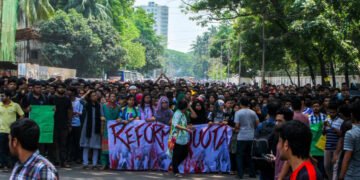The changes follow others recently implemented since the start of the Trump administration
The following is an English translation of the provided text, rewritten to convey the same meaning with some linguistic changes.
In a move drawing criticism for its subjective nature, U.S. authorities have announced that immigrants applying for a legal path to live and work in the country will now undergo screening for “anti-Americanism.” Critics are concerned that this new policy grants officers excessive discretion to deny applicants based on a vague and potentially biased assessment.
US Citizenship and Immigration Services said officers will now consider whether an applicant for benefits, such as a green card, “endorsed, promoted, supported, or otherwise espoused” anti-American, terrorist or antisemitic views.
According to a statement from USCIS spokesman Matthew Tragesser, “Benefits from the United States should not be granted to those who hold the nation in contempt and actively promote anti-American ideologies. The ability to live and work in this country is a privilege, not an inherent right.”
It isn’t specified what constitutes anti-Americanism and it isn’t clear how and when the directive would be applied.
“The message is that the U.S. and immigration agencies are going to be less tolerant of anti-Americanism or antisemitism when making immigration decisions,” Elizabeth Jacobs, director of regulatory affairs and policy at the Center for Immigration Studies, a group that advocates for immigration restrictions, said on Tuesday.
Jacobs stated that while the government is offering more explicit guidance on the behaviors and practices officers should consider, the element of discretion remains. “The agency can’t instruct officers to deny something outright, they can only ask them to consider it as a negative factor in their decision,” she explained.
Critics worry the policy update will allow for more subjective views of what is considered anti-American and allow an officer’s personal bias to cloud his or her judgment.
“For me, the really big story is they are opening the door for stereotypes and prejudice and implicit bias to take the wheel in these decisions. That’s really worrisome,” said Jane Lilly Lopez, associate professor of sociology at Brigham Young University.
The policy changes are the latest in a series of measures implemented since the start of the Trump administration. These include social media vetting and a new process for naturalization applicants that assesses their ‘good moral character. This new assessment will not only look for the absence of misconduct but also consider the applicant’s positive attributes and contributions.
“It means you are going to just do a whole lot more work to provide evidence that you meet our standards,” Lopez said.
Experts disagree on the constitutionality of the policy involving people who are not U.S. citizens and their freedom of speech. Jacobs, of the Center for Immigration Studies, said First Amendment rights do not extend to people outside the US or who are not US citizens.
Ruby Robinson, senior managing attorney with the Michigan Immigrant Rights Center, believes the Bill of Rights and the US Constitution protects all people in the United States, regardless of their immigration status, against government encroachment. “A lot of this administration’s activities infringe on constitutional rights and do need to be resolved, ultimately, in courts,” Robinson added.
Attorneys are advising clients to adjust their expectations.
“People need to understand that we have a different system today and a lot more things that apply to U.S. citizens are not going to apply to somebody who’s trying to enter the United States,” said Jaime Diez, an immigration attorney based in Brownsville, Texas.
Jonathan Grode, managing partner of Green and Spiegel immigration law firm, said the policy update was not unexpected considering how the Trump administration approaches immigration.
“This is the outcome of the election. They’ve been given the power to interpret the rules as they see fit,” Grode explained. “Their consistent policy is to narrow the strike zone, even though the fundamental law has not changed.”
“We elected these people, so they have the authority to interpret the rules as they please,” Grode stated. “Their goal is always to reduce the strike zone, while the underlying law remains the same.”










































































